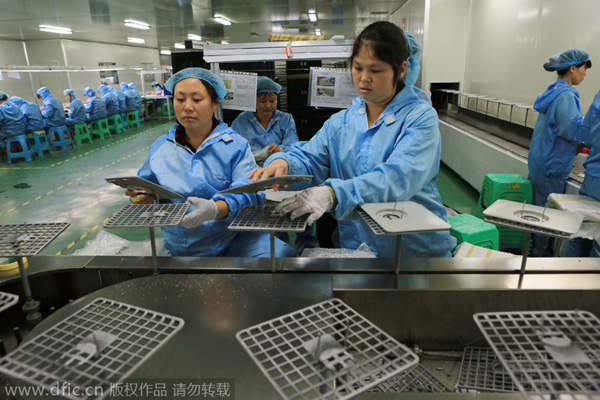 |
|
Employees process laptop components at an industrial park in Chongqing, April 22, 2014. [Photo/IC] |
Biel Crystal Manufactory (HK) Ltd, however, is happy it stayed put.
Based in Huizhou city in the southern province of Guangdong, Biel produces the outer screen glass used for Apple and Samsung smartphones.
It was just over two years ago that Biel president Yeung Kin-man had to weigh up the pros and cons of relocating his production facilities, which employed 70,000 people, to somewhere in Southeast Asia. All around him, firms were leaving Guangdong enticed by lower operational costs that would get their products more bang for their buck.
Wages in the Pearl River Delta region in southern China have risen significantly since 2014. This, along with commodity price volatility and the slowing growth of the global smartphone market was threatening profitability at Biel.
"Wages in the River Delta region are three times as much as in Myanmar or Vietnam, and will double in the next five years." said Li Peideng, Biel chief operating officer.
This trend, rising wages, can be seen across the region, forcing many labor-intensive factories - from clothes and furniture to electronic parts - to move to more affordable locations abroad or in China's hinterland. Those still based in the region speak of how their factory floors - once bustling centers of industry with thousands of employees - are lucky if they have a few hundred.
Despite this, Yeung chose to stay, but, not without setting major changes in motion to counter rising labor costs and ensure the company had a future.
Therefore, it was out with the low-end products and in with the tech-intensive offerings, which have a wider profit margin.
As chance would have it, as Biel was shaking up its business model along came a product that fit its "tech-intensive, high-profit" brief: Curved glass. The company had actually begun to research curved glass back in 2011 and mass production - of products that were destined for major smartphone models, such as Samsung's Galaxy Edge series - followed in 2014.
Biel said curved glass generates the largest portion of its profits. Orders for curved glass increased the company's revenue by 55 percent year-on-year. The product saved Biel.
"We have actually had to turn down some orders because we couldn't handle them," Yeung said.
To accommodate mounting orders and contain overhead costs, Biel is expanding its production base in Huizhou and increasing production-line automation.
It will also increase its 600-member research team to 1,000.
"Our most pressing task is ensuring our research and development team can design new products that meet our clients' demands," Yeung said.
Annual R&am spend at Biel exceeds 4 percent of its revenue.
Demand for its new glass product is not just from the overseas heavyweights.
While it supplies around 70 percent of Samsung smartphone glass and 60 percent of glass for the Apple iPhone, domestic smartphone makers are placing more orders as they ascend the global smartphone market ladder.
Statistics, compiled by tech consultancy Gartner, show that although Samsung and Apple retained their top two positions in smartphone sales in the first quarter this year, the number of handsets that they have sold has shrunk from the same period a year ago. Emerging Chinese brands Huawei, Xiaomi and the up-and-coming Oppo are threatening to upset the apple cart.
Biel did not disclose the exact number of glass products it has made for domestic smartphone manufacturers but said their share in the company's overall production volume is rising.
The future looks much brighter for Biel. It is currently mulling an initial public offering on the Chinese mainland's A-share market or in Hong Kong, according to a report in China Business News. The company expects revenue to grow 15 percent to 25 billion yuan ($3.85 billion) this year.
